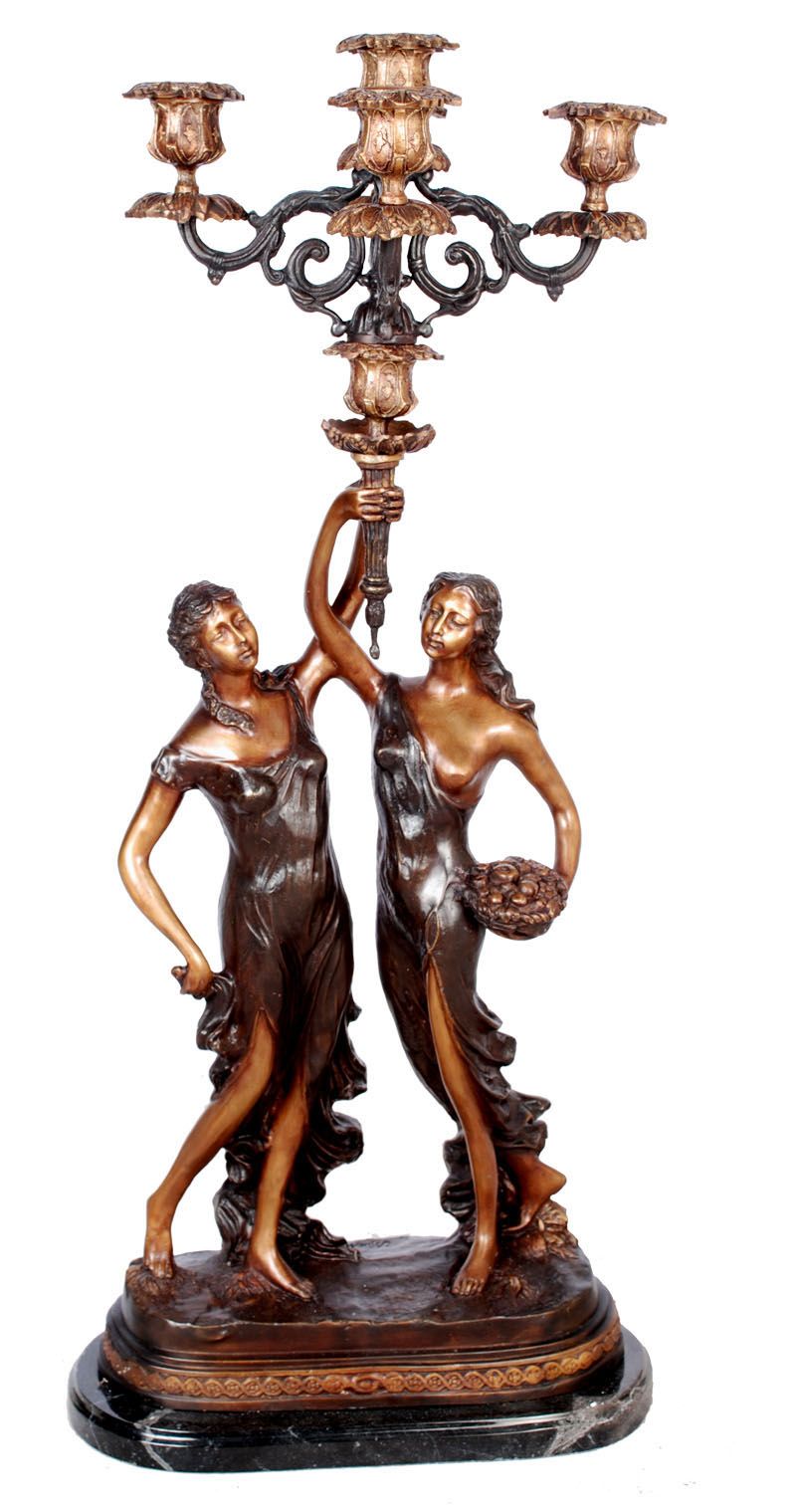 In this Anton Chekhov story the mother of a man too poor to pay for treatment sends his doctor a gift in gratitude for saving his life. There is only one problem: the gift, an antique bronze candelabra, features statuettes of two naked women in a not safe for work or home pose. The doctor passes it on as an unwelcome gift to his lawyer, who in turn donates it at a benefit for an aspiring comic actor. Unfortunately for the doctor, the actor decides to sell it. Themes include gratitude, perception (the subjectivity of art appreciation), morality, appearance, coincidence. More…
In this Anton Chekhov story the mother of a man too poor to pay for treatment sends his doctor a gift in gratitude for saving his life. There is only one problem: the gift, an antique bronze candelabra, features statuettes of two naked women in a not safe for work or home pose. The doctor passes it on as an unwelcome gift to his lawyer, who in turn donates it at a benefit for an aspiring comic actor. Unfortunately for the doctor, the actor decides to sell it. Themes include gratitude, perception (the subjectivity of art appreciation), morality, appearance, coincidence. More…
Archives
The Kiss
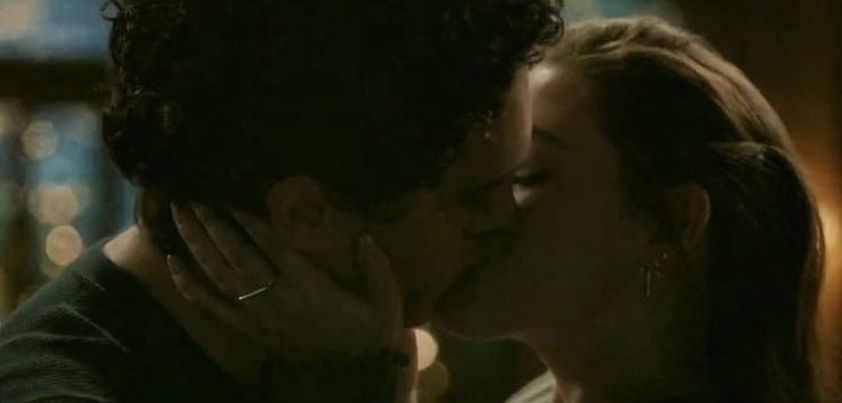 In this Anton Chekhov story, a mistaken kiss in a darkened room temporarily transforms the life of a shy, insecure army officer. He returns to duty on a high, wondering who the woman was and fanaticizing that he could be as successful in love and life as his fellow officers. Some weeks later, he eagerly returns to the scene. When nothing special takes place, he sees the folly of his summer dreams and fancies. In addition to Chekhov’s common message of the cruelty and unpredictability of life, themes include misunderstanding, human desire, self-delusion, raised hopes and shattered dreams. More…
In this Anton Chekhov story, a mistaken kiss in a darkened room temporarily transforms the life of a shy, insecure army officer. He returns to duty on a high, wondering who the woman was and fanaticizing that he could be as successful in love and life as his fellow officers. Some weeks later, he eagerly returns to the scene. When nothing special takes place, he sees the folly of his summer dreams and fancies. In addition to Chekhov’s common message of the cruelty and unpredictability of life, themes include misunderstanding, human desire, self-delusion, raised hopes and shattered dreams. More…
The Darling
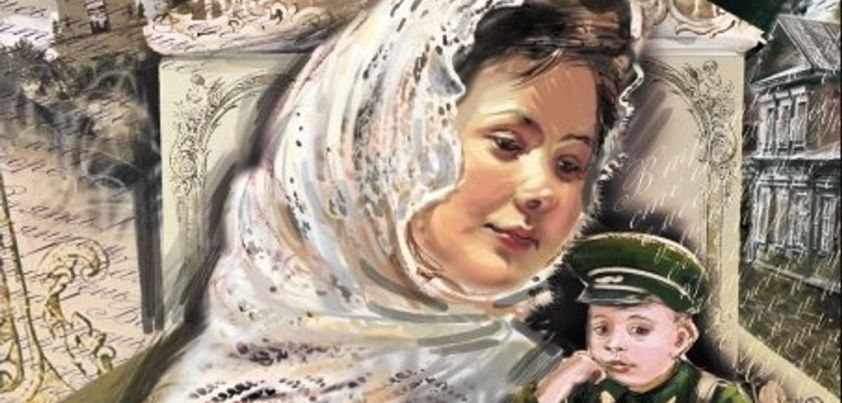 In psychological terms, Anton Chekhov’s ‘darling’ (Olga) suffers from Codependency Personality Disorder. More specifically, she is a vicarious codependent – someone who suspends their identity and gains fulfillment through the accomplishments of another. Olga’s ‘attachments’ in life include her father, a theatre manager, a timber merchant, a veterinary surgeon, and a young boy. Her relationship with the boy differs from the others. Being forced to assume a ‘motherly’ role rekindles Olga’s female identity. Sadly, motherhood and codependency don’t sit well together. In rediscovering her own identity, Olga begins to smother that of the boy. Themes: codependency, subservience, death, abandonment, identity, motherhood. More…
In psychological terms, Anton Chekhov’s ‘darling’ (Olga) suffers from Codependency Personality Disorder. More specifically, she is a vicarious codependent – someone who suspends their identity and gains fulfillment through the accomplishments of another. Olga’s ‘attachments’ in life include her father, a theatre manager, a timber merchant, a veterinary surgeon, and a young boy. Her relationship with the boy differs from the others. Being forced to assume a ‘motherly’ role rekindles Olga’s female identity. Sadly, motherhood and codependency don’t sit well together. In rediscovering her own identity, Olga begins to smother that of the boy. Themes: codependency, subservience, death, abandonment, identity, motherhood. More…
An Upheaval
 Major themes of his story by Anton Chekhov include social class, pride, respect, dignity and courage. A young woman in her first job as a governess returns from a walk to find the woman of the house searching her room for a missing brooch. She is so offended and incensed that, despite entreaties by the woman’s husband, she decides to leave. An unusual (for Chekhov) aspect of the story is that here we have a relatively powerless woman stand up to the humiliating treatment of her aristocratic employer, even though it may cost her and her parents dearly. More…
Major themes of his story by Anton Chekhov include social class, pride, respect, dignity and courage. A young woman in her first job as a governess returns from a walk to find the woman of the house searching her room for a missing brooch. She is so offended and incensed that, despite entreaties by the woman’s husband, she decides to leave. An unusual (for Chekhov) aspect of the story is that here we have a relatively powerless woman stand up to the humiliating treatment of her aristocratic employer, even though it may cost her and her parents dearly. More…
Rothschild’s Fiddle (Violin)
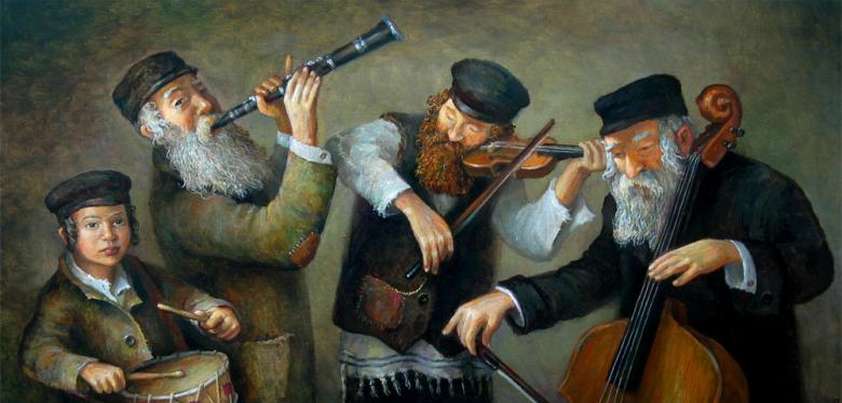 Many of Anton Chekhov’s stories deal with the struggles of the Russian working class. Some, like The Looking Glass and Misery, are quite depressing. This story, which deals with the themes of greed, prejudice and death, includes elements of dark humour and ends on a positive note. Yakov the coffin-builder measures his success by missed moneymaking opportunities. His only happiness is his violin, which he plays in a village band. When his wife dies, he regrets not having done more to enjoy life. He makes some amends on his deathbed by leaving his violin to a most unlikely person. More…
Many of Anton Chekhov’s stories deal with the struggles of the Russian working class. Some, like The Looking Glass and Misery, are quite depressing. This story, which deals with the themes of greed, prejudice and death, includes elements of dark humour and ends on a positive note. Yakov the coffin-builder measures his success by missed moneymaking opportunities. His only happiness is his violin, which he plays in a village band. When his wife dies, he regrets not having done more to enjoy life. He makes some amends on his deathbed by leaving his violin to a most unlikely person. More…
Vanka
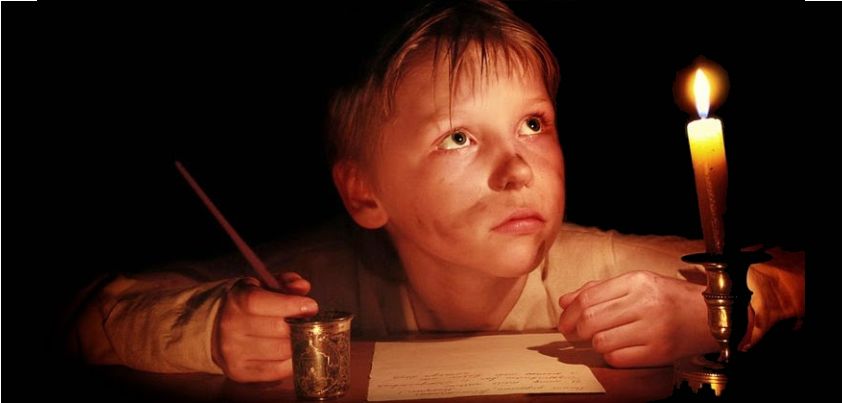 This poignant Christmas story by Anton Chekhov relates how a young boy recently apprenticed to a shoemaker writes a letter to his grandfather pleading to be taken home. He complains of continually being beaten and mistreated, and has no one to turn to for comfort. The city and its ways are foreign to him, and he misses the Christmas preparations and season’s joy in his home village. Sadly, his incompletely addressed letter will never reach its destination. Themes include social class, child-family separation, child abuse, innocence, loneliness, misery, desperation and hope. More…
This poignant Christmas story by Anton Chekhov relates how a young boy recently apprenticed to a shoemaker writes a letter to his grandfather pleading to be taken home. He complains of continually being beaten and mistreated, and has no one to turn to for comfort. The city and its ways are foreign to him, and he misses the Christmas preparations and season’s joy in his home village. Sadly, his incompletely addressed letter will never reach its destination. Themes include social class, child-family separation, child abuse, innocence, loneliness, misery, desperation and hope. More…
Misery / The Lament
 In this story by Anton Chekhov, sledge driver Iona Potapov is distraught because his son has died and he feels alone in the world. Another translation of the title is “The Lament” (a show of sorrow for someone who has died or something that is gone). The story addresses the question: What could be worse than the sadness associated with losing a loved one? Chekhov’s answer: To feel so lonely and cut off from the world that you have no one to talk to about it.. Themes include grief, discomfort, indifference, cruelty, loneliness, the healing power of animals. More…
In this story by Anton Chekhov, sledge driver Iona Potapov is distraught because his son has died and he feels alone in the world. Another translation of the title is “The Lament” (a show of sorrow for someone who has died or something that is gone). The story addresses the question: What could be worse than the sadness associated with losing a loved one? Chekhov’s answer: To feel so lonely and cut off from the world that you have no one to talk to about it.. Themes include grief, discomfort, indifference, cruelty, loneliness, the healing power of animals. More…
The Death of a Government Clerk
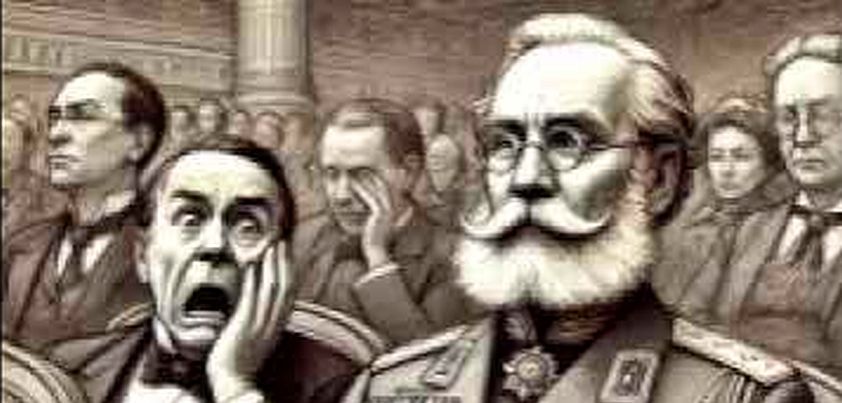 In this playful story by Anton Chekhov, a government clerk enjoying a night at the opera is dismayed when an unexpected sneeze lands droplets on the bald head of a civilian General. Although his immediate apology is accepted, the clerk not only makes a nuisance of himself with continued apologies during the performance, but pesters the general over the next two days trying to explain what happened. As the general becomes increasingly angry, the clerk becomes increasingly anxious until the stress gets too much for him. Themes include social class (living in fear), guilt, insecurity, paranoia, anxiety. More…
In this playful story by Anton Chekhov, a government clerk enjoying a night at the opera is dismayed when an unexpected sneeze lands droplets on the bald head of a civilian General. Although his immediate apology is accepted, the clerk not only makes a nuisance of himself with continued apologies during the performance, but pesters the general over the next two days trying to explain what happened. As the general becomes increasingly angry, the clerk becomes increasingly anxious until the stress gets too much for him. Themes include social class (living in fear), guilt, insecurity, paranoia, anxiety. More…
Oysters
 In this story by Anton Chekhov a young boy so weak from hunger that he can barely stand sees a sign in a restaurant advertising oysters. He knows that oysters are some kind of seafood. However, he does not know what they look like. In his hunger-affected state, the boy imagines himself eating creatures half-way between a crab and a frog. He then pictures himself eating up everything around him. He suddenly comes back to earth when two rich “gentlemen” agree to introduce him to the real thing. Themes include poverty, social class, insensitivity, shame, false pride, vanity, unconditional love. More…
In this story by Anton Chekhov a young boy so weak from hunger that he can barely stand sees a sign in a restaurant advertising oysters. He knows that oysters are some kind of seafood. However, he does not know what they look like. In his hunger-affected state, the boy imagines himself eating creatures half-way between a crab and a frog. He then pictures himself eating up everything around him. He suddenly comes back to earth when two rich “gentlemen” agree to introduce him to the real thing. Themes include poverty, social class, insensitivity, shame, false pride, vanity, unconditional love. More…
Gusev
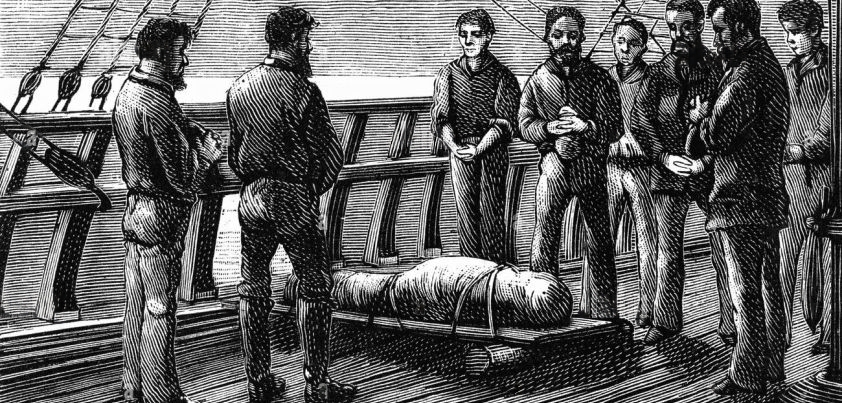 This Anton Chekhov story contrasts the attitudes towards social injustice of two Russian soldiers returning home by ship after serving in the Far East. Both are dying of tuberculosis, and neither survives the voyage. One (Gusev) is an uneducated, superstitious peasant who passively accepts his lot. The other (Pavel Ivanovich) is a bitter, fallen intellectual who looks down on “lesser” men and claims to actively oppose the Russian social system. Themes include social class, passivity vs. activism, memory and imagination, loneliness and alienation, the inconsequence of human suffering and death in the context of the glory of nature. More…
This Anton Chekhov story contrasts the attitudes towards social injustice of two Russian soldiers returning home by ship after serving in the Far East. Both are dying of tuberculosis, and neither survives the voyage. One (Gusev) is an uneducated, superstitious peasant who passively accepts his lot. The other (Pavel Ivanovich) is a bitter, fallen intellectual who looks down on “lesser” men and claims to actively oppose the Russian social system. Themes include social class, passivity vs. activism, memory and imagination, loneliness and alienation, the inconsequence of human suffering and death in the context of the glory of nature. More…
A Joke
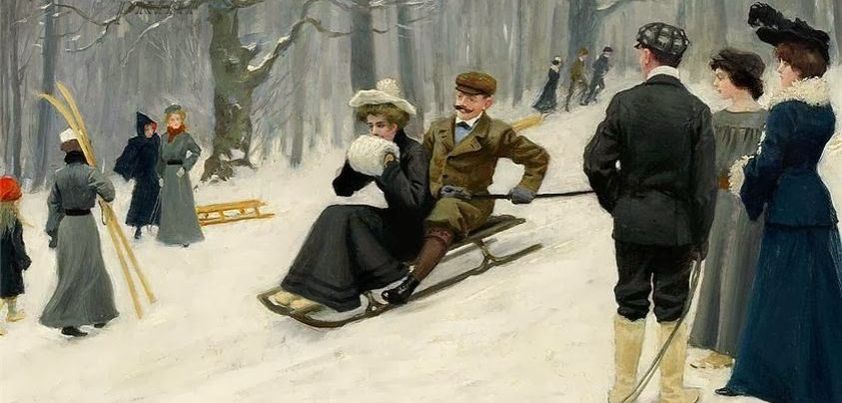 In this story by Anton Chekhov, a young man plays a trick on a terrified lady-friend by whispering a ghostly I love you as they speed down a mountain on a toboggan. Unsure of what she heard, the woman asks the man to repeat the ride over and over. Each time they do so, he whispers the same words. Soon it becomes an obsession and every day she wants to go up the mountain to listen for the words. Her reaction when she thinks she has the answer is a surprise. Themes include fear, innocence, playful deception, confusion, obsession, regret. More…
In this story by Anton Chekhov, a young man plays a trick on a terrified lady-friend by whispering a ghostly I love you as they speed down a mountain on a toboggan. Unsure of what she heard, the woman asks the man to repeat the ride over and over. Each time they do so, he whispers the same words. Soon it becomes an obsession and every day she wants to go up the mountain to listen for the words. Her reaction when she thinks she has the answer is a surprise. Themes include fear, innocence, playful deception, confusion, obsession, regret. More…
Home
 This story by Anton Chekhov explores the topic of parent-child communication. A court prosecutor learns that on two occasions his seven-year-old son stole some of his tobacco and was caught smoking. In true prosecutorial style, he does his best to point out the dangers of smoking. However, each time he raises an argument, the boy drifts off on a tangent and changes the subject. Recognizing he isn’t getting through to his son, he abandons logic and successfully communicates the message through a bedtime story. Themes include father-son relationships, punishment vs. discipline, logic vs. imagination, the power of storytelling. More…
This story by Anton Chekhov explores the topic of parent-child communication. A court prosecutor learns that on two occasions his seven-year-old son stole some of his tobacco and was caught smoking. In true prosecutorial style, he does his best to point out the dangers of smoking. However, each time he raises an argument, the boy drifts off on a tangent and changes the subject. Recognizing he isn’t getting through to his son, he abandons logic and successfully communicates the message through a bedtime story. Themes include father-son relationships, punishment vs. discipline, logic vs. imagination, the power of storytelling. More…
The Bet
 This Anton Chekhov opens with a dinner discussion about capital punishment. A banker claims the death penalty is kind because a lifetime in prison is not worth living. A lawyer argues that any life is better than no life at all. To prove his point, the banker bets the lawyer a small fortune that he couldn’t survive being locked up for many years with minimal contact with the outside world. Towards the end of the period, the banker visits him with murderous intent. Themes include crime and punishment, idealism and conviction, isolation and dehumanization, acquired wisdom, greed and excess. More…
This Anton Chekhov opens with a dinner discussion about capital punishment. A banker claims the death penalty is kind because a lifetime in prison is not worth living. A lawyer argues that any life is better than no life at all. To prove his point, the banker bets the lawyer a small fortune that he couldn’t survive being locked up for many years with minimal contact with the outside world. Towards the end of the period, the banker visits him with murderous intent. Themes include crime and punishment, idealism and conviction, isolation and dehumanization, acquired wisdom, greed and excess. More…
A Problem
 In this Anton Chekhov story, wealthy family members consider what to do about a nephew who has issued a false promissory note (IOU) in one of their names. Do they repay the debt to preserve family honor and avoid a scandal, or let justice take its course? On learning of the decision, the unscrupulous young man uses it to extort further money from an uncle trying to help him and, in the process, grudgingly admits an unfortunate aspect of his character. Themes: crime and consequences; justice/civic duty vs. family honor; nature vs. nurture, hedonism of the young upper-class, pride, despair. More…
In this Anton Chekhov story, wealthy family members consider what to do about a nephew who has issued a false promissory note (IOU) in one of their names. Do they repay the debt to preserve family honor and avoid a scandal, or let justice take its course? On learning of the decision, the unscrupulous young man uses it to extort further money from an uncle trying to help him and, in the process, grudgingly admits an unfortunate aspect of his character. Themes: crime and consequences; justice/civic duty vs. family honor; nature vs. nurture, hedonism of the young upper-class, pride, despair. More…
The Looking-Glass
 In this story by Anton Chekhov, a young woman dreams 24/7 about getting married and settling down with the perfect man. One night, while sitting in front of her looking-glass, she has a vision of what the future may hold. She sees the reality of living and raising a family in rural Russia in the late 1800s. The vision encompasses many of Chekhov’s common themes: love, hope, disease, fear, financial struggle, the challenges of parenthood, death and despair. The woman’s cry of Why is it, what is it for? introduces a final theme: disillusionment. Her dream has become a nightmare. More…
In this story by Anton Chekhov, a young woman dreams 24/7 about getting married and settling down with the perfect man. One night, while sitting in front of her looking-glass, she has a vision of what the future may hold. She sees the reality of living and raising a family in rural Russia in the late 1800s. The vision encompasses many of Chekhov’s common themes: love, hope, disease, fear, financial struggle, the challenges of parenthood, death and despair. The woman’s cry of Why is it, what is it for? introduces a final theme: disillusionment. Her dream has become a nightmare. More…
A Defenseless Creature
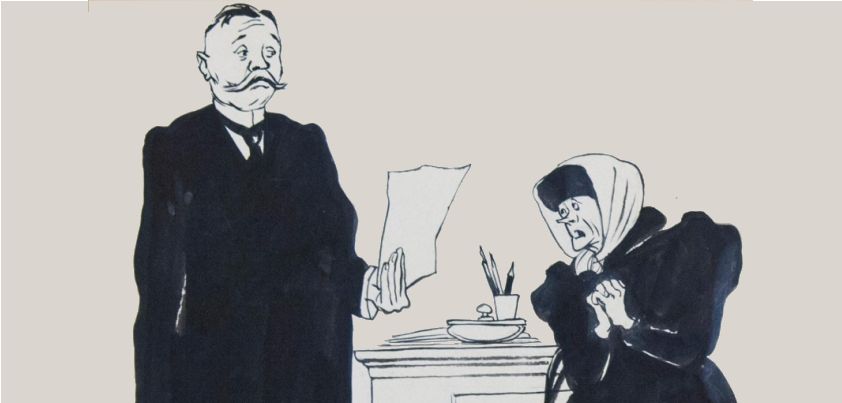 In addition to his tales highlighting serious issues such as poverty, class, death and unfulfilled expectations, Anton Chekhov wrote dozens of comic short stories to support himself through medical school. In this story, a persistent, shrew-like woman wears down a sickly banker. The exasperated man finally pays money the woman claims is owing to her husband out of his own pocket, even though the alleged debt has nothing to do with his bank. Despite the woman repeatedly describing herself as such, readers are left wondering if the harried banker is the titular “defenseless creature”. Themes: bureaucracy, communication, desperation, persistence. More…
In addition to his tales highlighting serious issues such as poverty, class, death and unfulfilled expectations, Anton Chekhov wrote dozens of comic short stories to support himself through medical school. In this story, a persistent, shrew-like woman wears down a sickly banker. The exasperated man finally pays money the woman claims is owing to her husband out of his own pocket, even though the alleged debt has nothing to do with his bank. Despite the woman repeatedly describing herself as such, readers are left wondering if the harried banker is the titular “defenseless creature”. Themes: bureaucracy, communication, desperation, persistence. More…
The Lady With the Dog
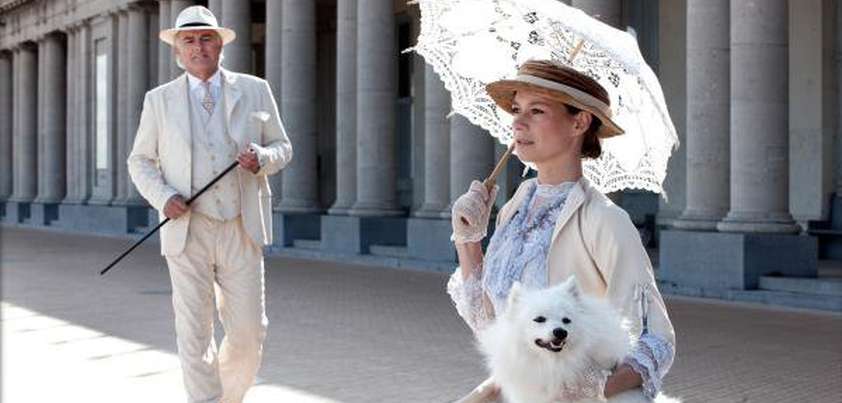 Anton Chekhov’s Lady With the Dog is about a philandering misogynist who meets a much younger woman while on vacation. Both have unhappy marriages; both are open to holiday romance. They enjoy a brief affair, then go their separate ways. After parting, each becomes obsessed with the memory of the other. He tracks her down, and soon they are planning a future together. The story has an open ending, but one suspects that each now looks at relationships and the world in a new way. Themes: love, infidelity, guilt, morality, chauvinism, sexual objectification, commitment. More…
Anton Chekhov’s Lady With the Dog is about a philandering misogynist who meets a much younger woman while on vacation. Both have unhappy marriages; both are open to holiday romance. They enjoy a brief affair, then go their separate ways. After parting, each becomes obsessed with the memory of the other. He tracks her down, and soon they are planning a future together. The story has an open ending, but one suspects that each now looks at relationships and the world in a new way. Themes: love, infidelity, guilt, morality, chauvinism, sexual objectification, commitment. More…
Gooseberries
 For me, the major theme of this philosophical story by Anton Chekhov (the nature of happiness) is conveyed through the symbolization of the plateful of gooseberries. This can be expressed in two seemingly conflicting idioms: one man’s (Ivan’s brother’s) sweet taste of success can leave a sour taste in someone else’s mouth. Put Chekhov’s way, complete happiness shouldn’t exist because it requires contributing to and/or being indifferent to the suffering of others; true fulfillment in life only comes from doing good. Other themes: obsession, greed, ego, class, isolation, mortality, city vs. country life, the beauty of nature. More…
For me, the major theme of this philosophical story by Anton Chekhov (the nature of happiness) is conveyed through the symbolization of the plateful of gooseberries. This can be expressed in two seemingly conflicting idioms: one man’s (Ivan’s brother’s) sweet taste of success can leave a sour taste in someone else’s mouth. Put Chekhov’s way, complete happiness shouldn’t exist because it requires contributing to and/or being indifferent to the suffering of others; true fulfillment in life only comes from doing good. Other themes: obsession, greed, ego, class, isolation, mortality, city vs. country life, the beauty of nature. More…